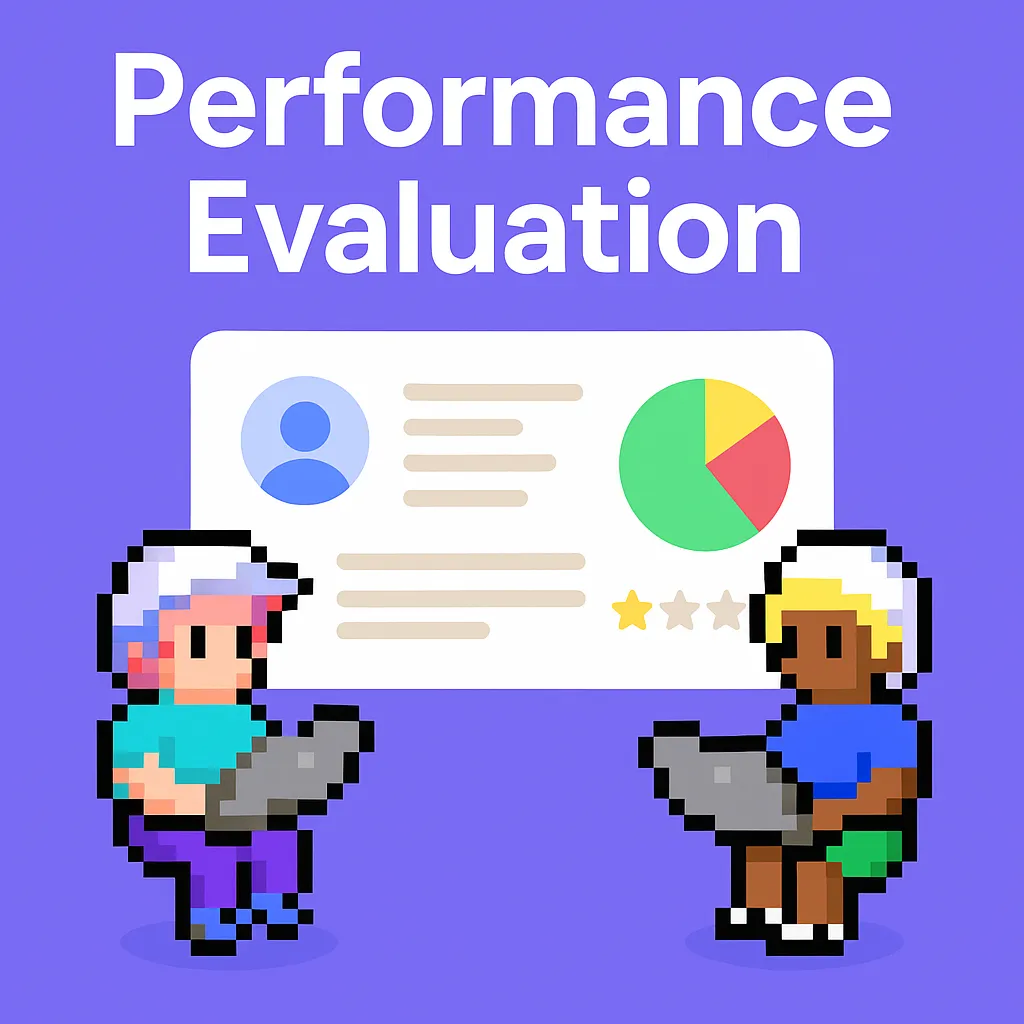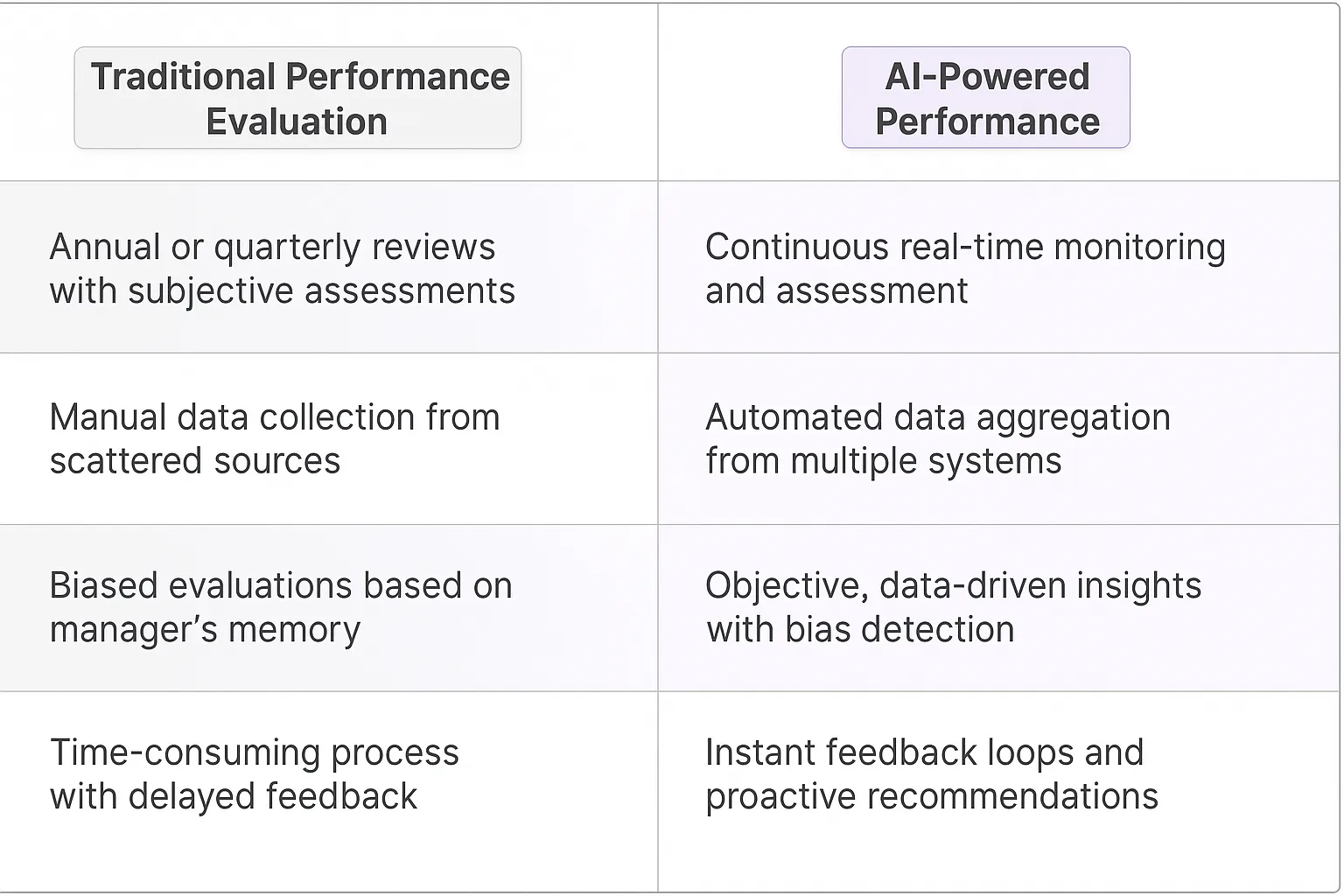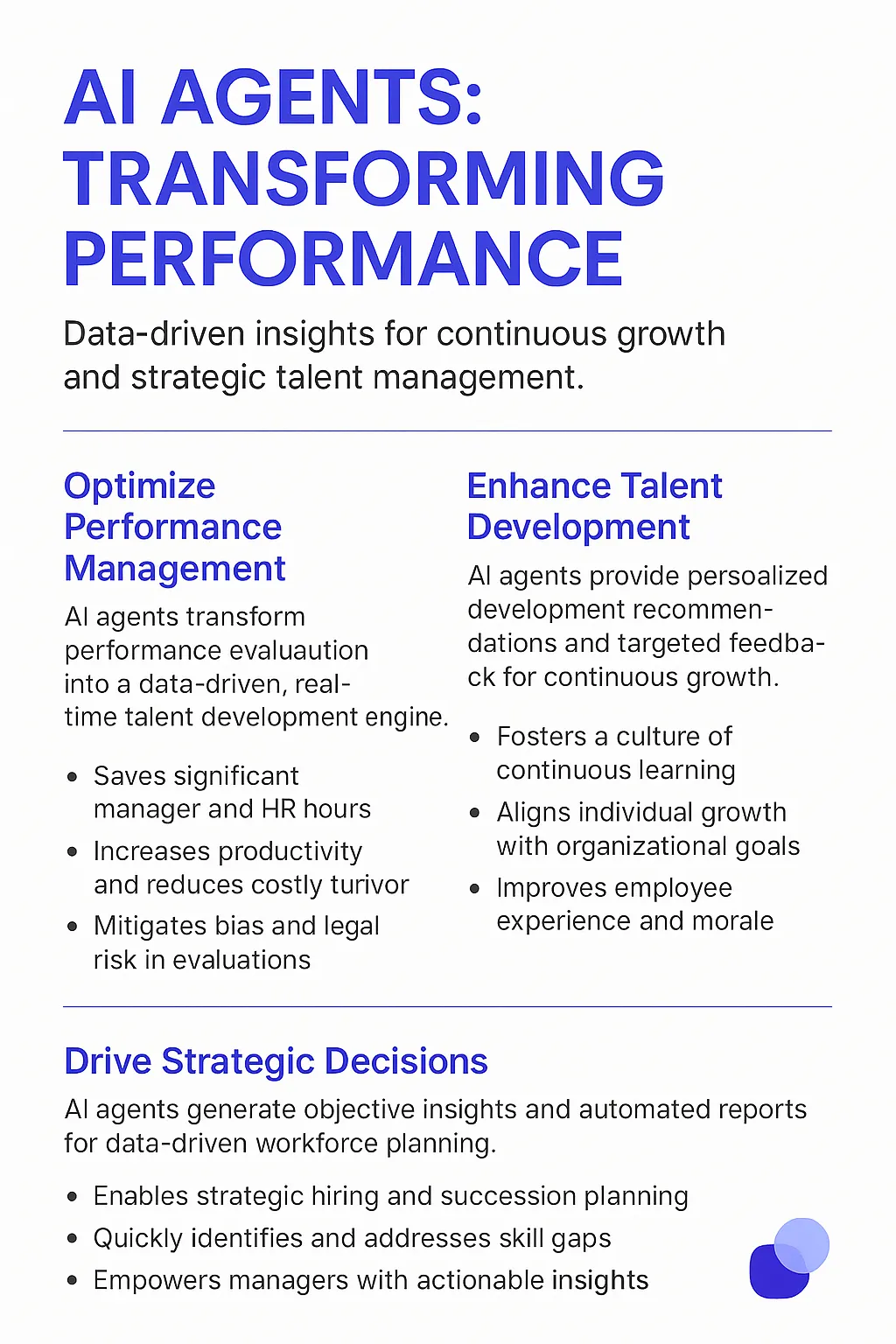Performance Evaluation AI Agents
The Evolution of Performance Evaluation with AI Agents
What is Performance Evaluation?
Performance evaluation is the process of assessing an employee's work performance, contributions, and achievements over a specific period. It's a critical function in talent management, traditionally involving managers reviewing an employee's accomplishments, setting goals, and providing feedback. However, this process has often been subjective, time-consuming, and prone to biases.
Key Features of Performance Evaluation
Performance evaluation typically includes several key features:1. Goal setting and tracking2. Competency assessment3. Feedback collection (often 360-degree)4. Performance metrics analysis5. Development planning6. Regular check-ins or reviewsAI agents are enhancing these features by providing data-driven insights, continuous monitoring, and personalized recommendations. They're not replacing human judgment, but rather augmenting it with powerful analytical capabilities.

Benefits of AI Agents for Performance Evaluation
What would have been used before AI Agents?
Before AI agents entered the scene, performance evaluations were often a painful, time-consuming process. Managers would spend hours poring over spreadsheets, trying to piece together a coherent picture of an employee's contributions. They'd rely on their own potentially biased memories, incomplete data, and gut feelings. It was like trying to solve a jigsaw puzzle with half the pieces missing and no reference picture.
Companies used clunky HR software that was about as user-friendly as a brick. These systems were glorified data entry tools, offering little in terms of insights or actionable recommendations. The result? Evaluations that were often subjective, inconsistent, and failed to capture the nuances of an employee's performance.
What are the benefits of AI Agents?
Enter AI agents - the game-changers in performance evaluation. These digital teammates are like having a team of expert HR consultants, data scientists, and psychologists working 24/7 to provide unbiased, data-driven insights.
First off, AI agents can process vast amounts of data from multiple sources - project management tools, communication platforms, customer feedback, and more. They're not just looking at the numbers, but understanding the context behind them. It's like having a bird's eye view of an employee's performance, but with the ability to zoom in on the tiniest details when needed.
AI agents excel at identifying patterns and trends that human managers might miss. They can spot an employee who's consistently going above and beyond in ways that don't show up in traditional metrics. Or they might flag potential issues before they become problems, allowing for proactive coaching and support.
One of the most powerful benefits is the ability to provide continuous feedback. Instead of the dreaded annual review, AI agents enable a more dynamic, ongoing evaluation process. They can offer real-time insights and suggestions, helping employees course-correct and improve on the fly.
Fairness and consistency are huge wins here. AI agents don't play favorites, they don't have bad days, and they don't let personal biases cloud their judgment. They evaluate everyone using the same criteria, leading to more equitable assessments across the board.
Finally, AI agents can generate personalized development plans based on an employee's strengths, weaknesses, and career goals. It's like having a personal career coach for every employee, constantly working to help them grow and succeed.
The bottom line? AI agents are transforming performance evaluations from a dreaded annual chore into a powerful tool for continuous improvement and growth. They're not replacing human managers, but augmenting them, freeing up time for more meaningful interactions and strategic decision-making. It's a shift that's long overdue in the world of HR and talent management.

Potential Use Cases of AI Agents for Performance Evaluation
Processes
Performance evaluation AI agents are poised to transform how organizations assess and develop their talent. These digital teammates can tackle complex, data-heavy processes that traditionally consume significant time and resources. Here's how they're reshaping key evaluation processes:
- Continuous feedback loops: AI agents can monitor employee performance metrics in real-time, providing ongoing insights rather than relying on infrequent review cycles.
- 360-degree reviews: By analyzing input from multiple sources, AI can synthesize a comprehensive view of an employee's performance, reducing bias and increasing objectivity.
- Goal tracking and alignment: AI agents can continuously assess progress towards individual and team goals, ensuring they remain aligned with broader organizational objectives.
- Skill gap analysis: Through deep learning algorithms, AI can identify skill deficiencies across the organization and suggest targeted development opportunities.
- Predictive performance modeling: By analyzing historical data and current trends, AI can forecast future performance, helping managers make proactive decisions.
Tasks
At a more granular level, performance evaluation AI agents excel at handling specific tasks that drive the evaluation process forward. They're particularly adept at:
- Data aggregation and normalization: Collecting performance data from various sources and standardizing it for fair comparison.
- Sentiment analysis: Parsing written feedback to gauge overall sentiment and identify key themes.
- Performance metric calculation: Automatically computing KPIs and other performance indicators based on raw data inputs.
- Report generation: Creating detailed, customized performance reports for individuals, teams, and departments.
- Scheduling and reminders: Managing the logistics of review cycles, ensuring all participants complete their parts on time.
- Bias detection: Analyzing evaluation language and scores to flag potential biases in the review process.
- Recommendation engine: Suggesting personalized development plans based on performance data and organizational needs.
These AI-driven processes and tasks aren't just incremental improvements - they're foundational shifts in how we approach performance evaluation. They're turning what was once a dreaded annual ritual into a dynamic, ongoing conversation about growth and impact.
The real power of these AI agents lies in their ability to uncover patterns and insights that humans might miss. They're not replacing managers or HR professionals; they're augmenting their capabilities, allowing them to focus on the high-touch, strategic aspects of talent development.
As these AI agents evolve, we'll likely see them become integral to how organizations nurture and retain top talent. They'll enable a more nuanced, data-driven approach to performance management that adapts in real-time to the changing needs of both employees and the business.
The companies that embrace these AI-powered evaluation tools early will have a significant advantage in the war for talent. They'll be able to identify and develop high-potential employees faster, create more engaging work environments, and ultimately drive better business outcomes.
The future of performance evaluation isn't just automated - it's intelligent, adaptive, and deeply personalized. And it's closer than you might think.

Industry Use Cases: AI Agents in Performance Evaluation
AI agents are reshaping performance evaluation across sectors, bringing a level of precision and insight that was previously unattainable. These digital teammates aren't just tools; they're catalysts for a fundamental shift in how we assess and develop talent. Let's dive into some industry-specific scenarios where AI is transforming the evaluation landscape.
From tech startups to Fortune 500 companies, organizations are leveraging AI to create more nuanced, data-driven performance reviews. These aren't your grandfather's annual assessments - we're talking about real-time feedback loops that capture the subtleties of employee contributions and growth trajectories.
But it's not just about gathering data. The real magic happens when AI agents start connecting dots that humans might miss. They're uncovering patterns in performance that can predict future success, identify untapped potential, and even flag early signs of burnout before they become critical issues.
As we explore these use cases, keep in mind: this isn't about replacing human judgment. It's about augmenting it, providing managers and HR professionals with a richer, more comprehensive view of their talent pool. The result? More informed decisions, better resource allocation, and ultimately, a more engaged and high-performing workforce.
Retail's AI-Driven Performance Revolution
Let's talk about how Performance Evaluation AI Agents are reshaping the retail landscape. It's not just about tracking sales numbers anymore; we're entering an era where AI can dissect employee performance with surgical precision.
Take a bustling department store chain. Traditionally, managers would rely on quarterly reviews and sporadic observations to gauge employee effectiveness. Now, imagine AI agents continuously analyzing everything from customer interactions to inventory management efficiency.
These digital teammates don't sleep. They're constantly crunching data, identifying patterns, and spotting opportunities for improvement that human managers might miss. For instance, they can correlate an employee's product knowledge with their sales conversion rates, or link their restocking speed with customer satisfaction scores.
But here's where it gets really interesting: these AI agents don't just evaluate; they predict and prescribe. They can forecast which employees are likely to excel in certain roles or departments based on their performance patterns. They can even suggest personalized training programs to address specific skill gaps.
The result? A retail workforce that's constantly evolving, adapting, and improving. It's not about replacing human judgment, but augmenting it with data-driven insights that were previously impossible to obtain at scale.
This isn't just incremental improvement; it's a fundamental shift in how retail operations are managed and optimized. And for the retailers who get this right, it could be the difference between thriving and merely surviving in an increasingly competitive landscape.
AI Performance Evaluation in the High-Stakes World of Finance
The finance industry is ripe for disruption when it comes to performance evaluation, and AI agents are leading the charge. We're not talking about your run-of-the-mill quarterly reviews here; this is a complete overhaul of how we measure and optimize human capital in one of the most competitive sectors on the planet.
Consider a global investment bank. Traditionally, assessing the performance of traders, analysts, and relationship managers has been as much art as science. But AI agents are changing the game, bringing unprecedented precision and insight to the process.
These digital teammates are constantly monitoring a vast array of metrics: trade execution quality, risk management effectiveness, client satisfaction scores, and even the nuanced language used in client communications. They're not just tallying numbers; they're uncovering hidden patterns and correlations that human managers could never spot.
For instance, an AI agent might identify that a particular trader consistently outperforms the market during periods of high volatility, but underperforms during stable conditions. Or it might recognize that an analyst's research reports tend to generate more client engagement when they include specific types of data visualizations.
But the real power lies in the predictive and prescriptive capabilities. These AI agents can forecast which employees are most likely to succeed in different roles or markets. They can suggest optimal team compositions for complex deals based on complementary skill sets. And they can create hyper-personalized development plans that evolve in real-time based on an employee's performance trajectory.
This isn't just about identifying top performers; it's about creating them. It's about building a workforce that's constantly adapting, learning, and pushing the boundaries of what's possible in finance.
The implications are profound. Banks that successfully implement these AI-driven performance evaluation systems will have a significant edge in talent acquisition, development, and retention. They'll be able to optimize their human capital with a level of precision that was previously unimaginable.
In an industry where the difference between good and great can mean billions of dollars, this technology isn't just an advantage - it's quickly becoming a necessity. The finance firms that embrace this shift will be the ones writing the rules of the game for decades to come.
Considerations for Performance Evaluation AI Agents
Technical Challenges
Building a performance evaluation AI agent is like trying to teach a computer to be your company's most discerning HR manager. It's a complex task that requires navigating a minefield of technical hurdles.
First up, data quality and quantity. Your AI is only as good as the data it's fed. In many organizations, performance data is scattered across various systems, often inconsistent, and sometimes just plain inaccurate. It's like trying to bake a gourmet cake with ingredients from a gas station convenience store – possible, but far from ideal.
Then there's the challenge of creating fair and unbiased algorithms. AI systems can inadvertently perpetuate existing biases in performance evaluations. It's like teaching a parrot to judge a singing contest – if all it's heard is opera, it might not appreciate rock or hip-hop.
Another technical hurdle is the integration with existing HR systems. Many companies are running on legacy software that's about as compatible with modern AI as a floppy disk is with a MacBook Air. Bridging this gap requires some serious technical gymnastics.
Operational Challenges
On the operational side, implementing a performance evaluation AI agent is like introducing a new player to a well-established team – it's bound to ruffle some feathers.
Employee trust and acceptance is a major hurdle. People are naturally skeptical about having their performance judged by an algorithm. It's like telling your team that their annual review will be conducted by HAL 9000 – not exactly comforting.
There's also the challenge of defining what "good performance" actually means across different roles and departments. Trying to create a one-size-fits-all model is like attempting to design a Swiss Army knife that can also function as a smartphone – theoretically possible, but practically problematic.
Training training managers and HR personnel to work alongside these AI agents is another operational challenge. It's not just about implementing new tech; it's about changing mindsets and workflows. This is akin to teaching seasoned chefs to cook with molecular gastronomy techniques – it requires patience, time, and a willingness to experiment.
Lastly, there's the ongoing challenge of maintaining and updating the AI system. As business needs evolve and new performance metrics emerge, the AI needs to keep pace. It's like trying to upgrade the engine of a car while it's still running – tricky, but necessary for long-term success.
The Future of Talent Management: AI-Driven Performance Evaluation
Performance evaluation AI agents are more than just a technological upgrade - they're catalyzing a fundamental shift in how organizations nurture and retain talent. By providing real-time, data-driven insights and personalized development plans, these digital teammates are transforming performance management from a dreaded annual ritual into an ongoing, dynamic process of growth and improvement.
The impact of this shift cannot be overstated. Organizations that embrace these AI-powered tools will have a significant edge in identifying high-potential employees, creating more engaging work environments, and driving better business outcomes. They're not just evaluating performance; they're actively shaping it, predicting future success, and uncovering hidden potential.
As we look to the future, it's clear that the integration of AI in performance evaluation isn't just a trend - it's the new standard. The companies that adapt quickly and effectively to this new paradigm will be the ones writing the rules of talent management for years to come. The future of performance evaluation is intelligent, adaptive, and deeply personalized - and it's already here.













